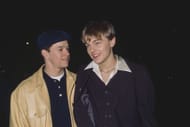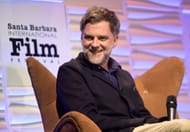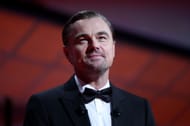Leonardo DiCaprio has opened up about the one decision in his career that still lingers in his mind. Speaking with director Paul Thomas Anderson for Esquire on August 13, 2025, DiCaprio admitted that his “biggest regret” was turning down the lead role in Anderson’s 1997 drama Boogie Nights.
At the time, Anderson had him in mind after seeing his performance in The Basketball Diaries. The role ultimately went to Mark Wahlberg. In the same conversation, Leonardo DiCaprio shared,
“I’ll say it even though you’re here: my biggest regret is not doing Boogie Nights. It was a profound movie of my generation. I can’t imagine anyone but Mark in it. When I finally got to see that movie, I just thought it was a masterpiece.”
He explained that he was already committed to filming James Cameron’s Titanic when the offer came through, making it impossible to take on both roles. While Titanic propelled him to global fame, DiCaprio has often reflected on how different his career path might have been had he been able to do both films.
He even recommended Wahlberg for the role of Eddie Adams, which became a turning point in Wahlberg’s acting career. More than 25 years later, DiCaprio and Anderson have finally teamed up for One Battle After Another, set to release on September 26.
Leonardo DiCaprio on turning down Boogie Nights

In the Esquire interview, Leonardo DiCaprio described Boogie Nights as “a profound movie of my generation” and reflected on why the opportunity slipped away. The 1997 film tells the story of Eddie Adams, later known as Dirk Diggler, a nightclub dishwasher discovered by adult film director Jack Horner during the 1970s porn boom.
The film explores the character’s rapid rise in the adult entertainment industry and his struggles behind the scenes. Wahlberg’s portrayal became one of his most recognised performances and helped him transition from music into serious acting.
Anderson recalled wanting DiCaprio for the role after seeing him in The Basketball Diaries, where his performance showed the intensity and range the part required. However, DiCaprio was already under contract for Titanic, and the production schedules overlapped. The actor had also said in a 2008 GQ interview that he wished
“I could have done them both”
rather than having to choose one project over another. In Esquire, DiCaprio added another reflection,
“It’s ironic that you’re the person asking that question, but it’s true.”
DiCaprio also explained that he personally recommended Mark Wahlberg for the role after working with him before, recognising that the script and character suited him. This decision, while closing one door for DiCaprio, opened another for Wahlberg and became a defining moment in his career. The mutual respect between DiCaprio and Anderson carried forward, eventually leading to their first collaboration decades later.
Also read: What is Josh Safdie's Marty Supreme about? Details explored
Leonardo DiCaprio and Paul Thomas Anderson’s first collaboration

The pair’s long-anticipated first project together is One Battle After Another. Leonardo DiCaprio revealed he had wanted to work with Anderson for “something like twenty years,” noting that they had discussed potential collaborations on and off but never found the right project until now.
The story follows Bob Ferguson, played by DiCaprio, a former revolutionary living off the grid who must track down his missing daughter, Willa (Chase Infiniti). The journey forces Ferguson to reconnect with former comrades and face the consequences of his past.
The film blends action sequences with political drama and an intimate father and daughter narrative, which Anderson described as the emotional core of the story.
“It’s about the disconnection between generations,” DiCaprio said. “We think we understand it, but we don’t.”
Anderson explained that the script had been on his desk for years, going through numerous rewrites and evolving into a project that combined his interest in political thrillers with character-driven storytelling. He credited Leonardo DiCaprio with bringing fresh ideas to the dynamic between Ferguson and Willa, which added depth to their on-screen relationship.
The cast also includes Sean Penn as a relentless law enforcement figure pursuing Ferguson, Teyana Taylor as Willa’s mother, and Benicio del Toro as Ferguson’s unpredictable allies. Filming featured high-intensity chase sequences across urban and rural settings, tense standoff moments, and instances of controlled chaos, a hallmark of Anderson’s directing style.
Anderson noted that some of the film’s most memorable moments emerged from spontaneous on-set decisions, giving the story an added sense of unpredictability.
Also read: Noah Centineo bags the lead role in the upcoming Rambo prequel movie, John Rambo
Leonardo DiCaprio on revisiting past work

When asked if he revisits his own films, Leonardo DiCaprio admitted that he rarely does, except for The Aviator.
“It was the first time as an actor I got to feel implicitly part of the production, rather than just an actor hired to play a role. I felt responsible in a whole new way,” he explained.
The Howard Hughes biopic, directed by Martin Scorsese, earned him an Academy Award nomination and remains one of his most personal projects. The film marks a shift in how he approached his craft. He recalled carrying a book on Hughes for years and almost making the film with another director before bringing Scorsese on board, which deepened his investment in the project.
During his conversation with Anderson, Leonardo DiCaprio also reflected on how much filmmaking has evolved. They discussed the shift in storytelling techniques, the rise of digital production, and the challenge of keeping narratives relevant while staying grounded in universal themes.
Anderson emphasised the value of focusing on stories that endure regardless of trends. While DiCaprio spoke about the importance of choosing roles that resonate on a personal and creative level, even if they carry risks.
With One Battle After Another releasing on September 26, 2025, the project represents more than just a new film for Leonardo DiCaprio. It marks the fulfilment of a decades-long goal to work with Anderson. The collaboration symbolises a full-circle moment in his career, moving from the regret of turning down Boogie Nights to finally stepping into a Paul Thomas Anderson world on screen.
